No good burger or sandwich is complete without a few slices of tangy pickles. The beautiful blend of sweet, salty, sour, and hot flavors makes pickles one of the best additions to your dishes. But are there any health benefits of pickles? Do they cause any side effects too? This article has the answers to all these questions along with some delicious recipes for you to try. Read on!
In This Article
A Brief History Of Pickles
Shutterstock
Pickles have been around for ages. People first started pickling fruits and vegetables in the Indian subcontinent, but soon after, the concept became famous in other parts of the world.
The ways of pickling may have changed as it crossed boundaries into different countries, but the end goal has remained the same – to extend the shelf life of certain fruits and vegetables.
Stylecraze TriviaThe concept of pickling dates back to Mesopotamia in 2400 BCE. Archeologists have discovered evidence of pickled cucumbers in Tigris valley dating back to 2030 BCE.
Pickling improves not only the taste of the foods but also keeps their nutrients intact. Learn more about the nutritional profile of the popular dill pickle in the next section.
Nutrition Profile Of Dill Cucumber Pickle
Shutterstock
When you think of pickles, dill pickles are the first to come to your mind. Dill cucumber pickles are the most commonly made pickles that contain healthy nutrients. One large dill pickle is (44.6 g) contains the following nutrients (1):
- Sodium (326 mg) and potassium (46.2 mg) are abundantly found in dill pickles. Calcium comes third at 21.8 mg. Phosphorus and magnesium are next (46 mg and 2.87 mg, respectively). Trace elements like zinc, copper, manganese, and iron are also found in these pickles.
- Dill pickles are low on carbohydrates (8 g) and fats (0.7 g).
- It contains only 0.4 g of fiber.
- When it comes to vitamins, one dill pickle has 848 µg of vitamin C, 81 µg of pantothenic acid (vitamin B5), 44 µg of niacin (vitamin B3), and 18.2 µg of beta-carotene. It also contains 6.87 µg of vitamin K, 48 µg of vitamin E, and 1.68 µg of vitamin A. Other vitamins are present, too, but in trace amounts.
Fun FactNovember 14th is celebrated as National Pickle Day in the US.
How do these nutrients work? Keep reading to know how pickles benefit your health.
Health Benefits Of Pickles
Shutterstock
From helping maintain a healthy gut to preventing colorectal cancer, pickle consumption has many purported health benefits. Check them out below.
1. May Promote Gut Bacteria
Pickles contain good bacteria that help in breaking down sugars in food. This process adds a sour taste to pickles and improves your body’s probiotic health, which is important for maintaining a healthy gut (2). In addition, multiple studies have concluded that the microflora in fermented pickles improve the gut microbiota (3).
2. May Help Regulate Blood Sugar Levels
A study conducted on Japanese adults with diabetes showed that consuming fermented foods, including soybeans and pickles, lowered the effects and symptoms of type 2 diabetes (5). In addition, the phytoestrogens and bioactive peptides present in pickles may help regulate blood sugar levels. However, research in this regard is limited.
Related: Easy Ways To Lower Blood Sugar Naturally And Safely
3. May Help Reduce Cholesterol Levels
Research suggests that eating gherkins helps reduce cholesterol levels, thanks to the fermentation caused by the lactic acid bacteria found in these pickles (4).
4. May Help Manage Muscle Cramps
An experimental study suggests that drinking pickle brine may help in reducing muscle cramps (6). Your muscles cramp up when there is a lack of hydration, which causes an imbalance in the electrolyte levels in your body. The sodium and potassium present in pickle brine may help improve this situation by balancing the electrolytes and improving hydration in the body. However, research in this regard is limited.
Related: Muscle Weakness Treatment At Home – Causes, 12 Remedies + Diet Tips
5. Help Maintain Electrolyte Levels While On A Keto Diet
The low carbohydrate intake in the ketogenic diet leads to a reduction in glucose production. This reduction triggers the production of ketone bodies and may cause dehydration. Pickles are rich in sodium and potassium. Intake of these foods rich in these minerals may help maintain a balance in electrolytes and keep your body hydrated (6), (7). However, more research is required to prove this effect of pickles.
6. May Reduce Oxidative Damage
Pickles contain high amounts of vitamins C and E, which have antioxidant properties. In addition, fermented foods contain essential antioxidants like riboflavin, folate, cobalamin, menaquinone, and thiamine. All these antioxidants help reduce oxidative stress that can cause damage to your body at the cellular level (3).
One study suggests that traditional Indian pickles contain antioxidants that may help prevent benzene formation, thus reducing cellular damage (8).
Related: Ketogenic Diet: Benefits And 5-Week Plan To Lose Weight
7. May Prevent Certain Cancers
Pickles are a powerhouse of probiotic bacteria. According to a study conducted in India, probiotic bacteria may help in the prevention of cancerous tumors in the colon, liver, and bladder (9). While pickle juice is still in need of further study, it appears to be a promising candidate for supplying these beneficial bacteria to the body.
Fermented pickles also contain certain probiotic strains that may help prevent colorectal cancer (3).
Preparing pickles at home is one of the best ways to derive all these benefits without losing too many nutrients to processing. Read on for some simple recipes.
How To Make Pickles At Home
Shutterstock
While the traditional dill pickles are made by fermenting cucumbers in saltwater, you can make instant pickles simply by pouring hot vinegar on them.
Let’s check out how to make some good old dill pickles at home.
You Will Need
- 1½ pounds of Persian or Kirby cucumbers
- 4 cloves of garlic (peeled and smashed)
- 2 teaspoons of dill seeds
- ½ teaspoon of red chili flakes (optional)
- 1 cup of rice vinegar
- 1 cup of water
- 1½ tablespoons of pickling or kosher salt
Subscribe
Before Making The Pickles
- If you are planning on storing the pickles long-term, wash and sterilize two wide-mouthed pint jars by boiling them and their lids in water for about 10 minutes. Sterilizing makes sure that no contaminants spoil your fermentation process.
- If you plan to simply refrigerate your pickles, wash your jars and continue on to the pickling process. Ensure the storing jars are free from any water residue to prevent spoiling of the pickle.
- Use a fresh spoon while scooping the pickle from the jar every time. This prevents cross-contamination, and the pickle can last for long without any unwanted microbial growth
Process
- Wash and dry the cucumbers and cut off their tops and bases to remove the enzymes responsible for the pickles becoming limp. You can cut them in any shape you like.
- Split the dry ingredients (except salt) between the two jars.
- Pack the cucumbers tightly in a jar, but make sure they don’t get crushed.
- In a pot, bring the vinegar, water, and salt to a rolling boil. Pour this brine into the jars, filling them just up to within half an inch below the mouth.
- Gently tap the sides of the jars to remove any air bubbles.
- Screw the lids on tightly.
- You can store the processed pickles at room temperature until you open them, after which they need to be refrigerated.
- If you do not plan to process them, let the jars cool down and refrigerate them directly.
Most foods cause certain side effects. Read on to learn about the side effects of eating pickles.
Side Effects Of Pickles
Shutterstock
The excess sodium and histamine in pickles may cause issues with your liver and kidneys, though there is not enough research to prove the same.
Various studies have found that excessive pickle consumption may increase the risk of gastric, stomach, and esophageal cancers (10).
More research is needed to know if there are any more side effects of eating too many pickles. You can consume two teaspoons of traditional pickles from time to time. It will add a good nutrient balance to your diet.
Pickles are considered a tangy addition to the dishes. But there are some health benefits of pickles when consumed in moderation. The microflora in fermented pickles promotes gut bacteria. In addition, the bioactive peptides and phytoestrogens help regulate blood sugar levels. Pickles also reduce cholesterol levels, help manage PMS symptoms, help in maintaining electrolyte levels in the keto diet, reduce oxidative damage and reduce the risk of liver, bladder, and colon cancer. However, excess consumption may trigger negative effects. Hence, moderate consumption is recommended to reap its maximum benefits.
Frequently Asked Questions
Is a pickle healthier than a cucumber?
No. A pickle is not healthier than a cucumber. Cucumber has low sodium and sugar and is healthier than a pickle.
Are pickles a superfood?
Yes, pickles are a superfood.
Is it OK to eat pickles every day?
No, it is not okay to eat pickles every day. The high sodium content may cause hypertension.
Are pickles good for your brain?
Yes, pickles may help improve your mental health and influence brain health (10).
Key Takeaways
- Pickles contain good bacteria that help improve your body’s probiotic health and maintain a healthy gut.
- According to an experimental study, drinking pickle brine may help manage muscle cramps and PMS symptoms.
- However, excess consumption of pickles may cause issues with your liver and kidneys and may also increase the risk of cancer.
Sources
Articles on StyleCraze are backed by verified information from peer-reviewed and academic research papers, reputed organizations, research institutions, and medical associations to ensure accuracy and relevance. Read our editorial policy to learn more.
- Pickles cucumber dill or kosher dill
https://fdc.nal.usda.gov/fdc-app.html#/food-details/324653/nutrients - Fermented Foods as a Dietary Source of Live Organisms
https://www.ncbi.nlm.nih.gov/labs/pmc/articles/PMC6117398/ - Traditionally fermented pickles: How the microbial diversity associated with their nutritional and health benefits?
https://www.sciencedirect.com/science/article/pii/S175646462030195X - Determining the probiotic potential of cholesterol-reducing Lactobacillus and Weissella strains isolated from gherkins (fermented cucumber) and south Indian fermented koozh
https://doi.org/10.1016/j.resmic.2015.03.002 - Reflex inhibition of electrically induced muscle cramps in hypohydrated humans
https://pubmed.ncbi.nlm.nih.gov/19997012/ - Ketogenic Diet
https://www.ncbi.nlm.nih.gov/books/NBK499830/ - Antioxidant Compounds in Traditional Indian Pickles May Prevent the Process-Induced Formation of Benzene
https://pubmed.ncbi.nlm.nih.gov/26735038/ - Cancer-preventing attributes of probiotics: an update
https://doi.org/10.3109/09637480903455971 - Pickled Vegetables
https://www.ncbi.nlm.nih.gov/books/NBK513652/ - Fermented foods, microbiota, and mental health: ancient practice meets nutritional psychiatry
https://www.ncbi.nlm.nih.gov/pmc/articles/PMC3904694/
Was this article helpful?
Related
The following two tabs change content below.
- Reviewer
- Author

Gayathri Vijay
Gayathri is a biotechnology graduate from Vellore Institute of Technology with a keen interest in research-oriented writing, microbiology, genetic engineering,… more
Gabrielle Kane
(MS, RDN, CSP, LD )Gabby is a Registered Dietitian Nutritionist and the founder of Peak Performance Nutrition LLC in Houston, Texas. She coaches both… more



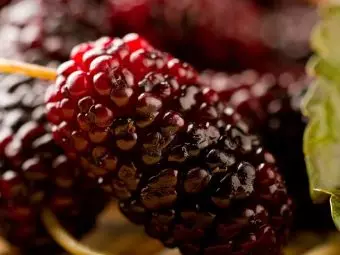 23 Amazing Benefits Of Mulberries (Shahtoot) For Skin, Hair, And Health
23 Amazing Benefits Of Mulberries (Shahtoot) For Skin, Hair, And Health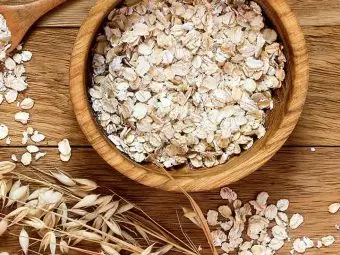 22 Best Benefits Of Oatmeal For Skin, Hair, And Health
22 Best Benefits Of Oatmeal For Skin, Hair, And Health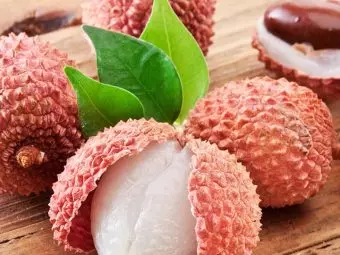 21 Amazing Benefits Of Litchis (Lychees) For Skin, Hair, And Health
21 Amazing Benefits Of Litchis (Lychees) For Skin, Hair, And Health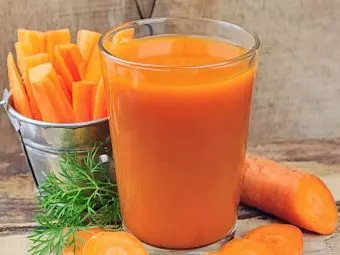 10 Nutritional Benefits Of Carrot Juice For Skin, Vision, And Health
10 Nutritional Benefits Of Carrot Juice For Skin, Vision, And Health Honey For Oily Skin – 12 Best Ways To Use It Effectively
Honey For Oily Skin – 12 Best Ways To Use It Effectively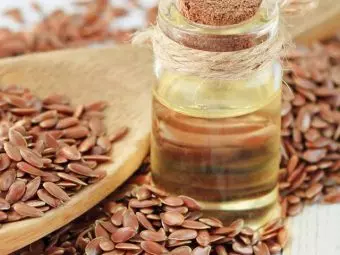 Flax Seeds Benefits & DIY Face Masks For Beautiful Skin
Flax Seeds Benefits & DIY Face Masks For Beautiful Skin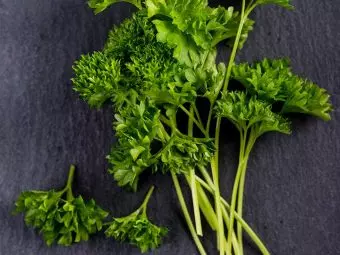 Parsley: 10 Potential Benefits And Uses, Nutrition, How To Make Tea
Parsley: 10 Potential Benefits And Uses, Nutrition, How To Make Tea 33 Wonderful Benefits Of Banana For Skin, Hair, And Health
33 Wonderful Benefits Of Banana For Skin, Hair, And Health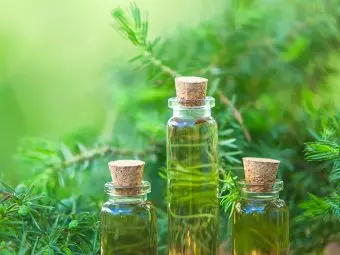 Tea Tree Oil For Warts: Benefits, How To Use, And More
Tea Tree Oil For Warts: Benefits, How To Use, And More